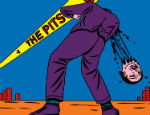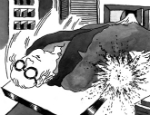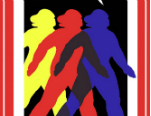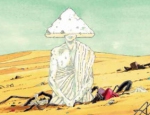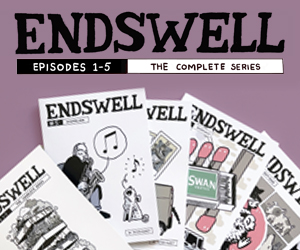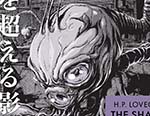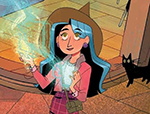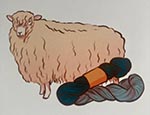In a beautifully produced edition from Breakdown Press, the first part of Generous Bosom, a major new work from rising star Conor Stechschulte, is a startling comic.
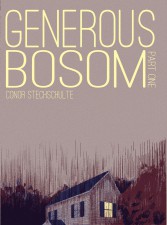 Without a lot of fuss, the London-based boutique publisher Breakdown Press has established a firm reputation for producing books of the highest quality, in terms of both content and production.
Without a lot of fuss, the London-based boutique publisher Breakdown Press has established a firm reputation for producing books of the highest quality, in terms of both content and production.
Their latest title represents something of a coup: the 70-page first issue of Generous Bosom marks the opening installment of what looks set to be a major work from rising star Conor Stechschulte, whose frenetic, bleak and enigmatic graphic novel The Amateurs was published to some acclaim last year by Fantagraphics.
In an altogether more contemporary setting than its precursor, the first part of Generous Bosom carries the title ‘A Dry Spell Ended’, referring to the end of a sexual drought as reported by the schlubby protagonist, Glen, to an old buddy of his, in a painfully well-observed session of blokey banter and bravado.
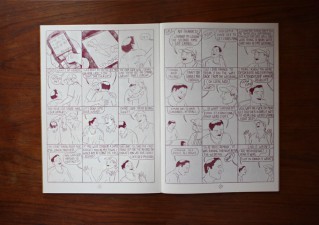 As Glen starts to roll out the tale of his amorous escapade, we flash back to the night in question. With all due nods to classic horror cinema, Glen finds himself forced from the main road by a heavy storm. In a nocturnal deluge captured beautifully through long vertical pencil strokes, Glen’s journey down an unfamiliar backwoods road is interrupted by a clearly not-accidental set of punctures.
As Glen starts to roll out the tale of his amorous escapade, we flash back to the night in question. With all due nods to classic horror cinema, Glen finds himself forced from the main road by a heavy storm. In a nocturnal deluge captured beautifully through long vertical pencil strokes, Glen’s journey down an unfamiliar backwoods road is interrupted by a clearly not-accidental set of punctures.
More horror expectations are raised as Glen makes his way to the only nearby house, as seen on the cover. However, once he’s invited in, the book moves more into Who’s Afraid of Virginia Woolf territory, as Glen finds himself thrown into the marriage of Art and Cindy – a volatile, depressive older husband and his tetchy, dissatisfied wife. As the tensions at the heart of the marriage are laid bare, Glen finds himself getting more involved than he might have wanted…
In style, the book partly resembles The Amateurs, using a tight grid with no gutters between the panels. After an intriguing first page, showcasing the possibilities of the risographic method used to produce the book, we move into a 4 x 3 grid. As in the earlier book, the lack of gutters heightens the sense of claustrophobia, of being locked in the page with the small cast of characters.
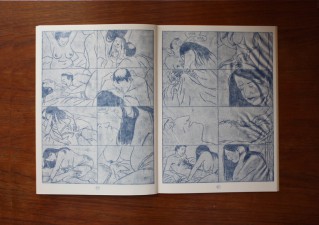 As the situation starts to escalate, the grid cranks up to a 5 x 4 layout. Much more stripped down than the richly textured linework of The Amateurs, the tiny frames step up the pace, never offering the eye a moment of rest. Meanwhile, the dramatic urgency is also reflected in frantic lettering, as if Stechschulte were trying to get everything down in ‘real time’.
As the situation starts to escalate, the grid cranks up to a 5 x 4 layout. Much more stripped down than the richly textured linework of The Amateurs, the tiny frames step up the pace, never offering the eye a moment of rest. Meanwhile, the dramatic urgency is also reflected in frantic lettering, as if Stechschulte were trying to get everything down in ‘real time’.
However, much more than the gruesome slapstick of The Amateurs, Generous Bosom highlights Stechschulte’s gift for propulsive but naturalistic dialogue, which keeps the comic compelling, even during lengthy sequences of talking heads and psychological unpacking.
The book also marks the latest chapter in Breakdown’s ongoing relationship with the South London print production house Victory Press, whose equal attention to quality makes this book a thing of beauty.
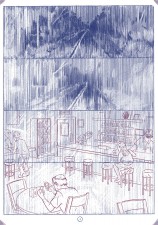 The layered effect produced by the risographic technique is used to great effect in Generous Bosom. As early as the very first page it creates something approaching a fade transition between past and present, and individual scenes are colour-coded very differently.
The layered effect produced by the risographic technique is used to great effect in Generous Bosom. As early as the very first page it creates something approaching a fade transition between past and present, and individual scenes are colour-coded very differently.
Later, as we see the outline of Glen and his pal commenting on what’s going on – or, at least, what Glen says is going on – it adds to the sense of ironic dislocation between the events that pass in the house and Glen’s narration of them. Behind the bluster we see the truth, which clearly haunts Glen.
This first volume ends with a familiar, generic-feeling ad-break kind of cliff-hanger. However, given the confidence with which he’s handled the rest of the book, I think we can be confident that Conor Stechschulte will come up with something altogether more electrifying when Generous Bosom makes its return. I can’t wait.
Conor Stechschulte (W/A) • Breakdown Press, £12.00, November 2014.






